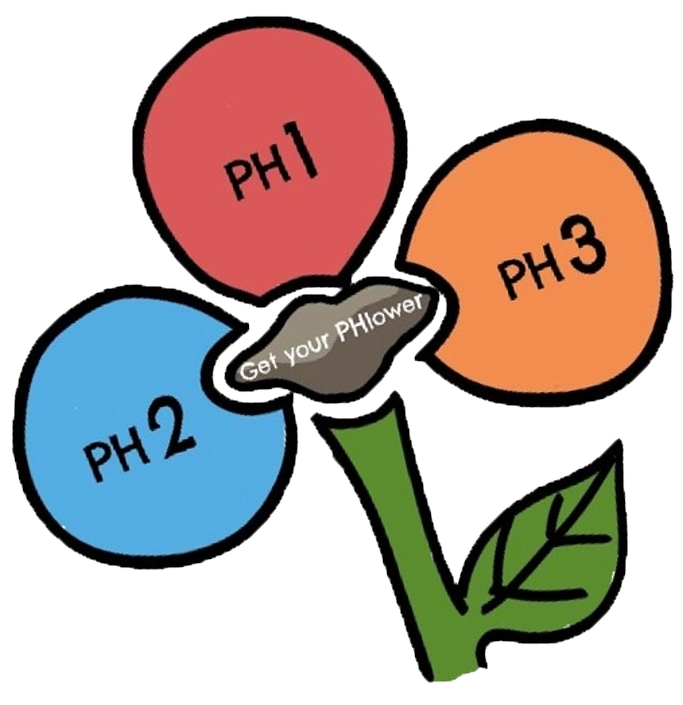Research lines
Research in OE:

An eye into disease mechanisms. We use purified proteins, engineered cell lines, pluripotent stem cells, and animal models to investigate the pathogenesis of PH, taking advantage of cutting edge computational analysis, sophisticated protein assays, genetic tools, such as the CRISPR/Cas9 technology, and targeted/untargeted multi-omics approaches, to improve diagnosis and to identify molecular targets for potentially new therapeutic approaches.

Looking for new pharmacological therapies. Integrating chemical synthesis and protein studies, we seek to identify potent ligands of enzymes involved in glyoxylate/oxalate metabolism as potential small molecule drugs that comprehensively target all endogenous oxalate sources.

Personalized medicine in PH. In a "one-size-does-not-fit-all" framework, we aim at identifying genetic modifiers and molecular biomarkers to predict disease severity, monitor disease course and anticipate response to therapy, in the perspective of a personalized medicine approach that maximizes the efficacy-to-safety profile.

PH natural history. The consortium maintains a registry of more than one thousand patients whose clinical data are available for research projects aiming at better understanding the natural history of PH, to improve genotype/phenotype correlations and predict disease outcome. Moreover, a collection of data on the response to new RNA interference drugs is ongoing, in order to evaluate long-term effects of these drugs.

The problem of systemic oxalosis. Patients affected by severe PH can undergo renal failure and accumulate oxalate in many tissues, a life-threatening condition called systemic oxalosis. This harmful condition reduces the quality of life of patients, reduces their chances for surgical and non-surgical treatments and complicates their clinical management. Clinical research studies aim at recognizing more and more predictors of systemic oxalosis in order to offer prompt, focused screening of patients.
Contact us if you are interested in getting involved in our research projects
Discover more about us & Hyperoxaluria

Dr. Shabbir Moochhala
Download CV
Dr Moochhala is an adult nephrologist at the Royal Free Hospital in London. He trained in Edinburgh and Newcastle upon Tyne, and has a special interest in renal physiology. His PhD examined pyrophosphate transport physiology in the kidney. He runs the UK's largest metabolic kidney stone clinical service at the Royal Free Hospital, and sees many adult patients with all forms of hyperoxaluria from across the UK and internationally. Shabbir contributes at international level to kidney research and education. He is Principal Investigator for four international clinical trials, and is national chair of the RADAR Hyperoxaluria Rare Disease Group. He founded and is chair of the NHS Rare Disease Collaborative Network in hyperoxaluria, and is setting up a national specialist multidisciplinary team for patients with hyperoxaluria, funded by the National Health Service.
ORCID:https://orcid.org/0000-0002-8941-6883
Publications

Wong K, Pitcher D, Braddon F, Downward L, Steenkamp R, Annear N, Barratt J, Bingham C, Chrysochou C, Coward RJ, Game D, Griffin S, Hall M, Johnson S, Kanigicherla D, Karet Frankl F, Kavanagh D, Kerecuk L, Maher ER, Moochhala S, Pinney J, Sayer JA, Simms R, Sinha S, Srivastava S, Tam FWK, Turner AN, Walsh SB, Waters A, Wilson P, Wong E, Taylor CM, Nitsch D, Saleem M, Bockenhauer D, Bramham K, Gale DP; RaDaR consortium. Effects of rare kidney diseases on kidney failure: a longitudinal analysis of the UK National Registry of Rare Kidney Diseases (RaDaR) cohort. Lancet. 2024 Mar 30;403(10433):1279-1289. doi: 10.1016/S0140-6736(23)02843-X. Epub 2024 Mar 13. PMID: 38492578.

Metry EL, Garrelfs SF, Deesker LJ, Acquaviva C, D'Ambrosio V, Bacchetta J, Beck BB, Cochat P, Collard L, Hogan J, Ferraro PM, Franssen CFM, Harambat J, Hulton SA, Lipkin GW, Mandrile G, Martin-Higueras C, Mohebbi N, Moochhala SH, Neuhaus TJ, Prikhodina L, Salido E, Topaloglu R, Oosterveld MJS, Groothoff JW, Peters-Sengers H. Determinants of Kidney Failure in Primary Hyperoxaluria Type 1: Findings of the European Hyperoxaluria Consortium. Kidney Int Rep. 2023 Aug 4;8(10):2029-2042. doi: 10.1016/j.ekir.2023.07.025. PMID: 37849991; PMCID: PMC10577369.

Groothoff JW, Metry E, Deesker L, Garrelfs S, Acquaviva C, Almardini R, Beck BB, Boyer O, Cerkauskiene R, Ferraro PM, Groen LA, Gupta A, Knebelmann B, Mandrile G, Moochhala S, Prytula A, Putnik J, Rumsby G, Soliman NA, Somani B, Bacchetta J. Clinical practice recommendations for primary hyperoxaluria: an expert consensus statement from ERKNet and OxalEurope. Nat Rev Nephrol. 2023 Mar;19(3):194-211. doi: 10.1038/s41581-022-00661-1. Epub 2023 Jan 5. PMID: 36604599.

Ariceta G, Collard L, Abroug S, Moochhala SH, Gould E, Boussetta A, Ben Hmida M, De S, Hunley TE, Jarraya F, Fraga G, Banos A, Lindner E, Dehmel B, Schalk G. ePHex: a phase 3, double-blind, placebo-controlled, randomized study to evaluate long-term efficacy and safety of Oxalobacter formigenes in patients with primary hyperoxaluria. Pediatr Nephrol. 2023 Feb;38(2):403-415. doi: 10.1007/s00467-022-05591-5. Epub 2022 May 12. PMID: 35552824; PMCID: PMC9763141.

Baum MA, Langman C, Cochat P, Lieske JC, Moochhala SH, Hamamoto S, Satoh H, Mourani C, Ariceta G, Torres A, Wolley M, Belostotsky V, Forbes TA, Groothoff J, Hayes W, Tönshoff B, Takayama T, Rosskamp R, Russell K, Zhou J, Amrite A, Hoppe B; PHYOX2 study investigators. PHYOX2: a pivotal randomized study of nedosiran in primary hyperoxaluria type 1 or 2. Kidney Int. 2023 Jan;103(1):207-217. doi: 10.1016/j.kint.2022.07.025. Epub 2022 Aug 22. PMID: 36007597.

Moochhala SH, Worcester EM, Primary hyperoxaluria: the adult nephrologist's point of view, Clinical Kidney Journal, Volume 15, Issue Supplement_1, May 2022, Pages i29–i32, https://doi.org/10.1093/ckj/sfac068
Dr. Giorgia Mandrile
Download CV
Dr. Giorgia Mandrile is a medical geneticist at the San Luigi Gonzaga Hospital (Orbassano – Italy). She trained in University of Torino and in her PhD studied primary hyperoxalurias genetics. She is involved in basic and clinical research on PH, mainly focused on genotype-phenotype correlations and PH epidemiology. She is also involved in several advisory boards for PH. Currently, she is the Italian section of the European Primary Hyperoxaluria online database.
ORCID:https://orcid.org/0000-0003-0849-2225
Publications

Metry EL, Garrelfs SF, Deesker LJ, Acquaviva C, D'Ambrosio V, Bacchetta J, Beck BB, Cochat P, Collard L, Hogan J, Ferraro PM, Franssen CFM, Harambat J, Hulton SA, Lipkin GW, Mandrile G, Martin-Higueras C, Mohebbi N, Moochhala SH, Neuhaus TJ, Prikhodina L, Salido E, Topaloglu R, Oosterveld MJS, Groothoff JW, Peters-Sengers H. Determinants of Kidney Failure in Primary Hyperoxaluria Type 1: Findings of the European Hyperoxaluria Consortium. Kidney Int Rep. 2023 Aug 4;8(10):2029-2042. doi: 10.1016/j.ekir.2023.07.025. PMID: 37849991; PMCID: PMC10577369.

Ferraro PM, D'Ambrosio V, Gambaro G, Giachino D, Groothoff J, Mandrile G. A clinical screening algorithm for primary hyperoxaluria type 1 in adults on dialysis. Nephrol Dial Transplant. 2024 Jan 31;39(2):367-370. doi: 10.1093/ndt/gfad184. PMID: 37708050; PMCID: PMC10828199.

Groothoff JW, Metry E, Deesker L, Garrelfs S, Acquaviva C, Almardini R, Beck BB, Boyer O, Cerkauskiene R, Ferraro PM, Groen LA, Gupta A, Knebelmann B, Mandrile G, Moochhala SS, Prytula A, Putnik J, Rumsby G, Soliman NA, Somani B, Bacchetta J. Clinical practice recommendations for primary hyperoxaluria: an expert consensus statement from ERKNet and OxalEurope. Nat Rev Nephrol. 2023 Mar;19(3):194-211. doi: 10.1038/s41581-022-00661-1. Epub 2023 Jan 5. PMID: 36604599.

Deesker LJ, Garrelfs SF, Mandrile G, Oosterveld MJS, Cochat P, Deschênes G, Harambat J, Hulton SA, Gupta A, Hoppe B, Beck BB, Collard L, Topaloglu R, Prikhodina L, Salido E, Neuhaus T, Groothoff JW, Bacchetta J. Improved Outcome of Infantile Oxalosis Over Time in Europe: Data From the OxalEurope Registry. Kidney Int Rep. 2022 Apr 20;7(7):1608-1618. doi: 10.1016/j.ekir.2022.04.012. PMID: 35812297; PMCID: PMC9263236.

Mandrile G, Beck B, Acquaviva C, Rumsby G, Deesker L, Garrelfs S, Gupta A, Bacchetta J, Groothoff J; OxalEurope Consortium/Erknet Guideline Workgroup On Hyperoxaluria. Genetic assessment in primary hyperoxaluria: why it matters. Pediatr Nephrol. 2023 Mar;38(3):625-634. doi: 10.1007/s00467-022-05613-2. Epub 2022 Jun 13. PMID: 35695965; PMCID: PMC9842587.

Mandrile G, Pelle A, Sciannameo V, Benetti E, D'Alessandro MM, Emma F, Montini G, Peruzzi L, Petrarulo M, Romagnoli R, Vitale C, Cellini B, Giachino D. Primary hyperoxaluria in Italy: the past 30 years and the near future of a (not so) rare disease. J Nephrol. 2022 Apr;35(3):841-850. doi: 10.1007/s40620-022-01258-4. Epub 2022 Feb 26. PMID: 35218550; PMCID: PMC8995259.

Metry EL, Garrelfs SF, Peters-Sengers H, Hulton SA, Acquaviva C, Bacchetta J, Beck BB, Collard L, Deschênes G, Franssen C, Kemper MJ, Lipkin GW, Mandrile G, Mohebbi N, Moochhala SH, Oosterveld MJS, Prikhodina L, Hoppe B, Cochat P, Groothoff JW; OxalEurope Consortium. Long-Term Transplantation Outcomes in Patients With Primary Hyperoxaluria Type 1 Included in the European Hyperoxaluria Consortium (OxalEurope) Registry. Kidney Int Rep. 2021 Nov 26;7(2):210-220. doi: 10.1016/j.ekir.2021.11.006. PMID: 35155860; PMCID: PMC8821040.

Ferraro PM, Gambaro G, Mandrile G, Montini G, Pasini A, Peruzzi L. [Management of Primary Hyperoxaluria Type 1 in Italy]. G Ital Nefrol. 2021 Apr 14;38(2):2021-vol2. Italian. PMID: 33852222.

Tandoi F, Cussa D, Peruzzi L, Catalano S, Camilla R, Mandrile G, Calvo PL, Pinon M, Dell'Olio D, Salizzoni M, Amoroso A, Romagnoli R. Combined liver kidney transplantation for primary hyperoxaluria type 1: Will there still be a future? Current transplantation strategies and monocentric experience. Pediatr Transplant. 2021 Jun;25(4):e14003. doi: 10.1111/petr.14003. Epub 2021 Mar 20. PMID: 33742750.

Dindo M, Mandrile G, Conter C, Montone R, Giachino D, Pelle A, Costantini C, Cellini B. The ILE56 mutation on different genetic backgrounds of alanine:glyoxylate aminotransferase: Clinical features and biochemical characterization. Mol Genet Metab. 2020 Sep-Oct;131(1-2):171-180. doi: 10.1016/j.ymgme.2020.07.012. Epub 2020 Aug 7. PMID: 32792227.

Pagliarini R, Castello R, Napolitano F, Borzone R, Annunziata P, Mandrile G, De Marchi M, Brunetti-Pierri N, di Bernardo D. In Silico Modeling of Liver Metabolism in a Human Disease Reveals a Key Enzyme for Histidine and Histamine Homeostasis. Cell Rep. 2016 Jun 7;15(10):2292-2300. doi: 10.1016/j.celrep.2016.05.014. Epub 2016 May 26. PMID: 27239044; PMCID: PMC4906368.

Pelle A, Cuccurullo A, Mancini C, Sebastiano R, Stallone G, Negrisolo S, Benetti E, Peruzzi L, Petrarulo M, De Marchi M, Marangella M, Amoroso A, Giachino D, Mandrile G. Updated genetic testing of Italian patients referred with a clinical diagnosis of primary hyperoxaluria. J Nephrol. 2017 Apr;30(2):219-225. doi: 10.1007/s40620-016-0287-4. Epub 2016 Mar 5. PMID: 26946417.

Montioli R, Roncador A, Oppici E, Mandrile G, Giachino DF, Cellini B, Borri Voltattorni C. S81L and G170R mutations causing Primary Hyperoxaluria type I in homozygosis and heterozygosis: an example of positive interallelic complementation. Hum Mol Genet. 2014 Nov 15;23(22):5998-6007. doi: 10.1093/hmg/ddu329. Epub 2014 Jul 2. PMID: 24990153; PMCID: PMC4204775.

Mandrile G, van Woerden CS, Berchialla P, Beck BB, Acquaviva Bourdain C, Hulton SA, Rumsby G; OxalEurope Consortium. Data from a large European study indicate that the outcome of primary hyperoxaluria type 1 correlates with the AGXT mutation type. Kidney Int. 2014 Dec;86(6):1197-204. doi: 10.1038/ki.2014.222. Epub 2014 Jul 2. PMID: 24988064.

Cochat P, Hulton SA, Acquaviva C, Danpure CJ, Daudon M, De Marchi M, Fargue S, Groothoff J, Harambat J, Hoppe B, Jamieson NV, Kemper MJ, Mandrile G, Marangella M, Picca S, Rumsby G, Salido E, Straub M, van Woerden CS; OxalEurope. Primary hyperoxaluria Type 1: indications for screening and guidance for diagnosis and treatment. Nephrol Dial Transplant. 2012 May;27(5):1729-36. doi: 10.1093/ndt/gfs078. PMID: 22547750.

Robbiano A, Mandrile G, De Marchi M, Beck B, Baasner A, Murer L, Benetti E, Giachino D. Novel human pathological mutations. Gene symbol: AGXT. Disease: hyperoxaluria. Hum Genet. 2010 Apr;127(4):468. PMID: 21488232.

Robbiano A, Frecer V, Miertus J, Zadro C, Ulivi S, Bevilacqua E, Mandrile G, De Marchi M, Miertus S, Amoroso A. Modeling the effect of 3 missense AGXT mutations on dimerization of the AGT enzyme in primary hyperoxaluria type 1. J Nephrol. 2010 Nov-Dec;23(6):667-76. PMID: 20564000.

Mandrile G, Robbiano A, Giachino DF, Sebastiano R, Dondi E, Fenoglio R, Stratta P, Caruso MR, Petrarulo M, Marangella M, De Marchi M. Primary hyperoxaluria: report of an Italian family with clear sex conditioned penetrance. Urol Res. 2008 Dec;36(6):309-12. doi: 10.1007/s00240-008-0162-4. Epub 2008 Nov 5. PMID: 18985333.
Dr. Cristina Martín-Higueras, Institute of Biomedical Technology, Univ of La Laguna, Spain
Download CV
Dr. Cristina Martin Higueras is a medical doctor and molecular biologist from University of La Laguna (Spain), with special interest in the molecular pathology of rare metabolic diseases. Her PhD set up the basis for substrate reduction therapy in Primary Hyperoxaluria (PH) type 1, being nowadays the most effective therapy for these patients. As a postdoctoral researcher in Universitätsklinikum Bonn (Germany), she evaluated the immunological renal response in PH mouse models, and the natural history of PH type 3 European patients. Currently, she coordinates the Spanish PH patient registry (OxalSpain) and the biochemical procedures for improving diagnosis and follow up of PH patients in Spain, in collaboration with the German Hyperoxaluria Center (Bonn, Germany). Cristina has organized two international PH meetings (Tenerife 2017, and Berlin 2022), and several PH patient meetings, as promoter of PH-Europe and Spanish Patient Advocacy groups (PH-Europe and APHES). Dr. Martin Higueras is the creator of the PHlower, the icon of Primary Hyperoxaluria.
ORCID:https://orcid.org/0000-0003-1139-4642
Publications
https://pubmed.ncbi.nlm.nih.gov/?term=martin-higueras+c&sort=date

Martin-Higueras C, Borghese L, Torres A, Fraga-Bilbao F, Santana-Estupiñán R, Stefanidis CJ, Tory K, Walli A, Gondra L, Kempf C, Gessner M, Habbig S, Eifler L, Schmitt CP, Rüdel B, Bartram MP, Beck BB, Hoppe B. Multicenter Long-Term Real World Data on Treatment With Lumasiran in Patients With Primary Hyperoxaluria Type 1. Kidney Int Rep. 2023 Oct 6;9(1):114-133. doi: 10.1016/j.ekir.2023.10.004. PMID: 38312792; PMCID: PMC10831356.

Hoppe B, Martin-Higueras C. Improving Treatment Options for Primary Hyperoxaluria. Drugs. 2022 Jul;82(10):1077-1094. doi: 10.1007/s40265-022-01735-x. Epub 2022 Jul 2. PMID: 35779234; PMCID: PMC9329168.

Martin-Higueras C, Garrelfs SF, Groothoff JW, Jacob DE, Moochhala SH, Bacchetta J, Acquaviva C, Zaniew M, Sikora P, Beck BB, Hoppe B. A report from the European Hyperoxaluria Consortium (OxalEurope) Registry on a large cohort of patients with primary hyperoxaluria type 3. Kidney Int. 2021 Sep;100(3):621-635. doi: 10.1016/j.kint.2021.03.031. Epub 2021 Apr 16. PMID: 33865885.

Moya-Garzón MD, Martín Higueras C, Peñalver P, Romera M, Fernandes MX, Franco-Montalbán F, Gómez-Vidal JA, Salido E, Díaz-Gavilán M. Salicylic Acid Derivatives Inhibit Oxalate Production in Mouse Hepatocytes with Primary Hyperoxaluria Type 1. J Med Chem. 2018 Aug 23;61(16):7144-7167. doi: 10.1021/acs.jmedchem.8b00399. Epub 2018 Aug 6. PMID: 30028141.

Martin-Higueras C, Luis-Lima S, Salido E. Glycolate Oxidase Is a Safe and Efficient Target for Substrate Reduction Therapy in a Mouse Model of Primary Hyperoxaluria Type I. Mol Ther. 2016 Apr;24(4):719-25. doi: 10.1038/mt.2015.224. Epub 2015 Dec 22. PMID: 26689264; PMCID: PMC4886931.
Prof. Barbara Cellini, Department of Medicine and Surgery, University of Perugia
Download CV
After graduating in Biological Sciences, Prof. Cellini was mainly involved in research projects on protein structure-function relationships, first as a PhD student and then as Assistant professor of Biochemistry at the University of Verona. In 2017 she moved to the University of Perugia as Associate Professor. Her initial approach based on studies on purified proteins has been implemented by molecular and cellular biology methods. This combined approach is now the backbone of prof. Cellini research, that also benefits from the collaboration with national and international groups. Her major interests are focused on rare diseases involving Vitamin B6-dependent enzymes, such as in particular Primary Hyperoxalurias. Prof. Cellini’s group has made important contributions to the elucidation of the molecular defect of pathogenic variants and of their response to Vitamin B6, as well as to preclinical studies aiming at developing new non-invasive therapeutic approaches.
ORCID:https://orcid.org/0000-0002-5221-9288
List of publications:https://pubmed.ncbi.nlm.nih.gov/?term=cellini+Barbara&sort=date
Dr. Jaap Groothoff
Download CV
Dr Groothoff is an emeritus (since April 2024) professor in paediatric nephrology with special interest in hyperoxaluria and kidney failure in children. He has been head of the department of paediatric nephrology of the Amsterdam UMC/Emma children’s Hospital from 2011 up to 2023. Former positions included head of the Master Program of the Medical School of the University of Amsterdam, chair of the ESPN Registry and chair of Oxaleurope. He has been involved in hyperoxaluria research since 1994, was one of the founders of Oxaleurope and is currently still leader of the sole Dutch expertise centre for hyperoxaluria in Amsterdam and leader of the nationwide lumasiran Orphan Drug Access Protocol, which serves as a pilot study for controlled access to expensive orphan drugs. He is still involved in basic hyperoxaluria research at the Amsterdam UMC and principle investigator for all hyperoxaluria related trials
ORCID:https://orcid.org/0000-0002-8467-3506
Hyperoxaluria related papers 2020-2025

van Harskamp D, Garrelfs SF, Oosterveld MJS, Groothoff JW, van Goudoever JB, Schierbeek H. Development and Validation of a New Gas Chromatography-Tandem Mass Spectrometry Method for the Measurement of Enrichment of Glyoxylate Metabolism Analytes in Hyperoxaluria Patients Using a Stable Isotope Procedure. Anal Chem. 2020. PMID: 32165440

Milliner DS, McGregor TL, Thompson A, Dehmel B, Knight J, Rosskamp R, Blank M, Yang S, Fargue S, Rumsby G, Groothoff J, Allain M, West M, Hollander K, Lowther WT, Lieske JC. Endpoints for Clinical Trials in Primary Hyperoxaluria. Clin J Am Soc Nephrol. 2020. PMID: 32165440

Garrelfs SF, Frishberg Y, Hulton SA, Koren MJ, O'Riordan WD, Cochat P, Deschênes G, Shasha-Lavsky H, Saland JM, Van't Hoff WG, Fuster DG, Magen D, Moochhala SH, Schalk G, Simkova E, Groothoff JW, Sas DJ, Meliambro KA, Lu J, Sweetser MT, Garg PP, Vaishnaw AK, Gansner JM, McGregor TL, Lieske JC; ILLUMINATE-A Collaborators. Lumasiran, an RNAi Therapeutic for Primary Hyperoxaluria Type 1. N Engl J Med. 2021, PMID: 33830344

Metry EL, van Dijk LMM, Peters-Sengers H, Oosterveld MJS, Groothoff JW, Ploeg RJ, Stel VS, Garrelfs SF.Pediatr Nephrol. 2021 PMID: 33830344

Martin-Higueras C, Garrelfs SF, Groothoff JW, Jacob D, Moochhala SH, Bacchetta J, Acquaviva C, Zaniew M, Sikora P, Beck BB, Hoppe B. A report from the European Hyperoxaluria Consortium (OxalEurope) Registry on a large cohort of patients with primary hyperoxaluria type 3. Kidney Int. 2021.PMID: 33865885

Frishberg Y, Deschênes G, Groothoff JW, Hulton SA, Magen D, Harambat J, van’t Hoff WG, Lorch U, Milliner DS, Lieske JC, Haslett P, Garg PP, Vaishnaw AK, Talamudupula S, Lu J, Habtemariam BA, Erbe DV, McGregor TL, Cochat P and on behalf of the study collaborators. Phase 1/2 Study of Lumasiran for Treatment of Primary Hyperoxaluria Type 1 A Placebo-Controlled Randomized Clinical Trial. Clin J Am Soc Nephrol. 2021. PMID: 33985991

Hoppe B, Koch A, Cochat P, Garrelfs SF, Baum MA, Groothoff JW, Lipkin G, Coenen M, Schalk G, Amrite A, McDougall D, Barrios K, Langman CB. Safety, pharmacodynamics, and exposure-response modeling results from a first in human phase 1 study of nedosiran in primary hyperoxaluria. Kidney Int. 2021. PMID: 34481803

Garrelfs S, van Harskamp D, Peters-Sengers H, van den Akker C, Wanders R, Wijburg F, van Goudoever J, Groothoff J, Schierbeek H, Oosterveld M. Endogenous Oxalate Production in Primary Hyperoxaluria Type 1 Patients. J Am Soc Nephrol 2021 PMID: 34686543

Metry EL, Garrelfs SF, Peters-Sengers H, Hulton SA, Acquaviva C, Bacchetta J, Beck BB, Collard L, Deschênes G, Franssen C, Kemper MJ, Lipkin GW, Mandrile G, Mohebbi N, Moochhala SH, Oosterveld MJS, Prikhodina L, Hoppe B, Cochat P, Groothoff JW; OxalEurope Consortium.. Long-Term Transplantation Outcomes in Patients With Primary Hyperoxaluria Type 1 Included in the European Hyperoxaluria Consortium Registry. Kidney Int Reports 2022. PMID: 35155860

Hulton SA, Groothoff JW, Frishberg Y, Koren MJ, Overcash JS, Sellier-Leclerc AL, Shasha-Lavsky H, Saland JM, Hayes W, Magen D, Moochhala SH, Coenen M, Simkova E, Garrelfs SF, Sas DJ, Meliambro KA, Ngo T, Sweetser MT, Habtemariam BA, Gansner JM, McGregor TL, Lieske JC. Randomized Clinical Trial on the Long-Term Efficacy and Safety of Lumasiran in Patients With Primary Hyperoxaluria Type 1. Kidney Int Rep. 2021. PMID: 35257062

Deesker LS, Garrelfs SF, Mandrile G, Oosterveld MJS, Cochat P, Deschênes G, Harambat J, Hulton SA, Gupta A Hoppe B, Beck BB, Collard L, Topaloglu R, Prikhodina L, Salido ED, Neuhaus TH, Groothoff JW, Bacchetta J . Improved outcome of infantile oxalosis over time in Europe: data from the OxalEurope Registry. Kidney Int Rep. 2022. PMID: 35812297

Mandrile G, Beck B, Acquaviva C, Rumsby G, Deesker LS, Garrelfs SF, Gupta A, Bacchetta J, Groothoff JW .Genetic assessment in Primary Hyperoxaluria: why it matters. Pediatr Nephrol. 2022. PMID: 35695965

Baum MA, Langman G, Cochat P, Lieske JC, Moochhala SH, Hamamoto S, Satoh H, Mourani C, Ariceta G, Torres A, Wolley M, Belostotsky V, Forbes TA, Groothoff JW, Hayes W, Tönshoff B,Takayama T, Rosskamp R, Russell K, Zhou J, Amrite A, Hoppe B. PHYOX2: A Pivotal Randomized Study of Nedosiran in Primary Hyperoxaluria Type 1 or 2. Kidney Int 2022. PMID: 36007597

Baum MA, Langman G, Cochat P, Lieske JC, Moochhala SH, Hamamoto S, Satoh H, Mourani C, Ariceta G, Torres A, Wolley M, Belostotsky V, Forbes TA, Groothoff JW, Hayes W, Tönshoff B,Takayama T, Rosskamp R, Russell K, Zhou J, Amrite A, Hoppe B. PHYOX2: A Pivotal Randomized Study of Nedosiran in Primary Hyperoxaluria Type 1 or 2. Kidney Int 2022. PMID: 36007597

Michael M, Groothoff JW, Shasha-Lavsky H, Lieske JC, Frishberg Y, Simkova E, Sellier-Leclerc AL, Devresse A, Guebre-Egziabher F, Bakkaloglu SA, Mourani C, Saqan R, Singer R, Willey R, Habtemariam B, Gansner JM, Bhan I, McGregor T, Magen D. Lumasiran for Advanced Primary Hyperoxaluria Type 1: Phase 3 ILLUMINATE-C Trial. Am J Kidney Dis. 2022 PMID: 35843439

Groothoff JW, Metry E, Deesker L, Garrelfs S, Acquaviva C, Almardini R, Beck BB, Boyer O, Cerkauskiene R, Ferraro PM, Groen LA, Gupta A, Knebelmann B, Mandrile G, Moochhala SS, Prytula A, Putnik J, Rumsby G, Soliman NA, Somani B, Bacchetta J. Clinical practice recommendations for primary hyperoxaluria: an expert consensus statement from ERKNet and OxalEurope. Nature Reviews Nephrol. 2023. PMID: 36604599 .

Garrelfs SF, Metry EL, van Harskamp D, Vaz FM, van den Akker CHP, Schierbeek H, Groothoff JW, Oosterveld MJS Glycolate oxidase inhibition by lumasiran varies between patients with primary hyperoxaluria type 1. Kidney Int. 2023. PMID: 36871948

Metry EL, Garrelfs SF, Peters-Sengers H, Vaz FM, Bijlsma JA, Neradova A, Oosterveld MJS, Groothoff JW Plasma oxalate and glycolate concentrations in dialysis patients with and without primary hyperoxaluria type 1. Nephrol Dial Transplant 2023 PMID: 36898675

Goldfarb DS, Lieske JC, Groothoff J, Schalk G, Russell K, Yu S, Vrhnjak B Nedosiran in primary hyperoxaluria subtype 3: results from a phase I, single-dose study (PHYOX4). Urolithiasis. 2023. PMID: 37273015

Elisabeth L Metry, Lisa J Deesker, Sander F Garrelfs, Michiel J S Oosterveld, Kerensa M Beekman , Marlies E A Cornelissen , Linda Koster-Kamphuis, Jaap W Groothoff Successful kidney-alone transplantation in a patient with PH1 on combination RNAinterference therapy. Kidney Int. 2023. PMID: 37349052

Metry EM, Garrelfs SF, Deesker LD, Acquaviva C, D’Ambrosio V, Bacchetta J, Beck BB, Cochat P, Collard L, Hogan J, Ferraro PM, Franssen CSM, Harambat J, Hulton SA, Lipkin GW, Mandrile G, Martin-Higueras C, Mohebbi N, Moochhala SH, Neuhaus TJ, Prikhodina L, Salido ED, Topaloglu R, Oosterveld MJS, Groothoff JW, Peters-Sengers H. Determinants of kidney failure in Primary Hyperoxaluria type 1: findings of the European Hyperoxaluria Consortium. Kidney Int Rep. 2023. PMID: 37849991

Ferraro PM, D'Ambrosio V, Gambaro G, Giachino D, Groothoff J, Mandrile G. A clinical screening algorithm for primary hyperoxaluria type 1 in adults on dialysis. Nephrol Dial Transplant. 2024. PMID: 37708050

Garrelfs SF, Chorny S, te Brinke H, Ruiter J, Groohoff J, Wanders RJA. Glyoxylate reductase: Definitive identification in human liver mitochondria, its importance for the compartment‐specific detoxification of glyoxylate. J Inherit Metab Dis. 2024. PMID: 38200664

Groothoff J, Sellier-Leclerc AL, Deesker L, Bacchetta J, Schalk G, Tönshoff B, Lipkin G, Lemoine S, Bowman T, Zhou J, Hoppe B. Nedosiran Safety and Efficacy in PH1: Interim Analysis of PHYOX3. Kidney Int Rep. 2024 Mar 4;9(5):1387-1396. PMID: 38707801

Saland JM, Lieske JC, Groothoff JW, Frishberg Y, Shasha-Lavsky H, Magen D, Moochhala SH, Simkova E, Coenen M, Hayes W, Hogan J, Sellier-Leclerc AL, Willey R, Gansner JM, Hulton SA. Efficacy and Safety of Lumasiran in Patients With Primary Hyperoxaluria Type 1: Results from a Phase III Clinical Trial. Kidney Int Rep. 2024.PMID: 3908173

Deesker LJ, Karacoban HA, Metry EL, Garrelfs SF, Bacchetta J, Boyer O, Collard L, Devresse A, Hayes W, Hulton SA, MartinHigueras C, Moochhala SH, Neuhaus TJ, Oh J, Prikhodina L, Sikora P, Oosterveld MJ, Groothoff JW, Mandrile G, Beck BB. Intrafamilial Disease Heterogeneity in Primary Hyperoxaluria Type 1. Kidney Int Rep. 2024. PMID: 39430166

Cellini B, Baum MA, Frishberg Y, Groothoff JW, Harris PC, Hulton SA, Knauf F, Knight J, Lieske JC, Lowther WT, Moochhala S, Nazzal L, Tasian GE, Whittamore JM, Sas DJ. Opportunities in Primary and Enteric Hyperoxaluria at the Cross-Roads Between the Clinic and Laboratory. Kidney Int Rep. 2024. PMID: 39534212

Wanders RJA, Groothoff JW, Deesker LJ, Salido E, Garrelfs SF. Human glyoxylate metabolism revisited: New insights pointing to multi-organ involvement with implications for siRNA-based therapies in primary hyperoxaluria. J Inherit Metab Dis. 2024 PMID: 39582099

Rosenberg N, Manders E, van den Berg S, Deesker LJ, Garrelfs SF, de Visser SJ, Groothoff JW, Hollak CEM. Application of four pricing models for orphan medicines: a case study for lumasiran. Orphanet J Rare Dis. 2024 Dec 23;19(1):485. PMID: 39716306

Deesker LJ, Oubram L, Almardini R, Baum MA, Bonilla-Felix M, Figueres L, Garrelfs SF, Groothoff JW, Ekulu PM, Müller RU, Oosterveld MJS, Qian S, Sayer JA, Soliman N, Moochhala SH, Bacchetta . Global access to management of primary hyperoxaluria: a survey on behalf of OxalEurope, G&K working group of the ERA, and ESPN. Nephrol Dial Transplant. 2025. PMID: 39984743

Sellier-Leclerc AL, Magen D, Shasha-Lavsky H, Simkova E, Devresse A, Guebre-Egziabher F, Michael M, Lieske JC, Frishberg Y, Bakkaloglu SA, Mourani C, Saqan R, Singer R, Guzzo I, Makarova N, Willey R, Kaspar C, Gansner JM, Groothoff JW Efficacy and Safety of Lumasiran for Advanced Primary Hyperoxaluria Type 1: 24-Month Follow-Up of the Phase 3 Illuminate-C Trial. Am J Kidney Dis. 2025. PMID: 40086686 .

Deesker LJ, Franssen CFM, Dorresteijn E, van de Kar NCAJ, Nurmohamed SA, Severs D, Garrelfs SF, Pisters-van Roy AAMG, Hollak CEM, Groothoff JW. Controlled access to lumasiran in primary hyperoxaluria type 1: evaluation of a new access route for orphan drugs in The Netherlands. Nephrol Dial Transplant. 2025. PMID: 40121182
Dr. Bodo Beck
Download CV
Bodo Beck is a pediatric nephrologist and medical geneticist at the University of Cologne Medical Center. Our group located at the Institute of Human Genetics has a broad interest in rare and inherited kidney disease and in particular in primary hyperoxaluria.
ORCID:https://orcid.org/0000-0003-0495-7670
List of publications:https://pubmed.ncibi.nlm.nih.gov/?term=Bodo+Beck&sort=date





